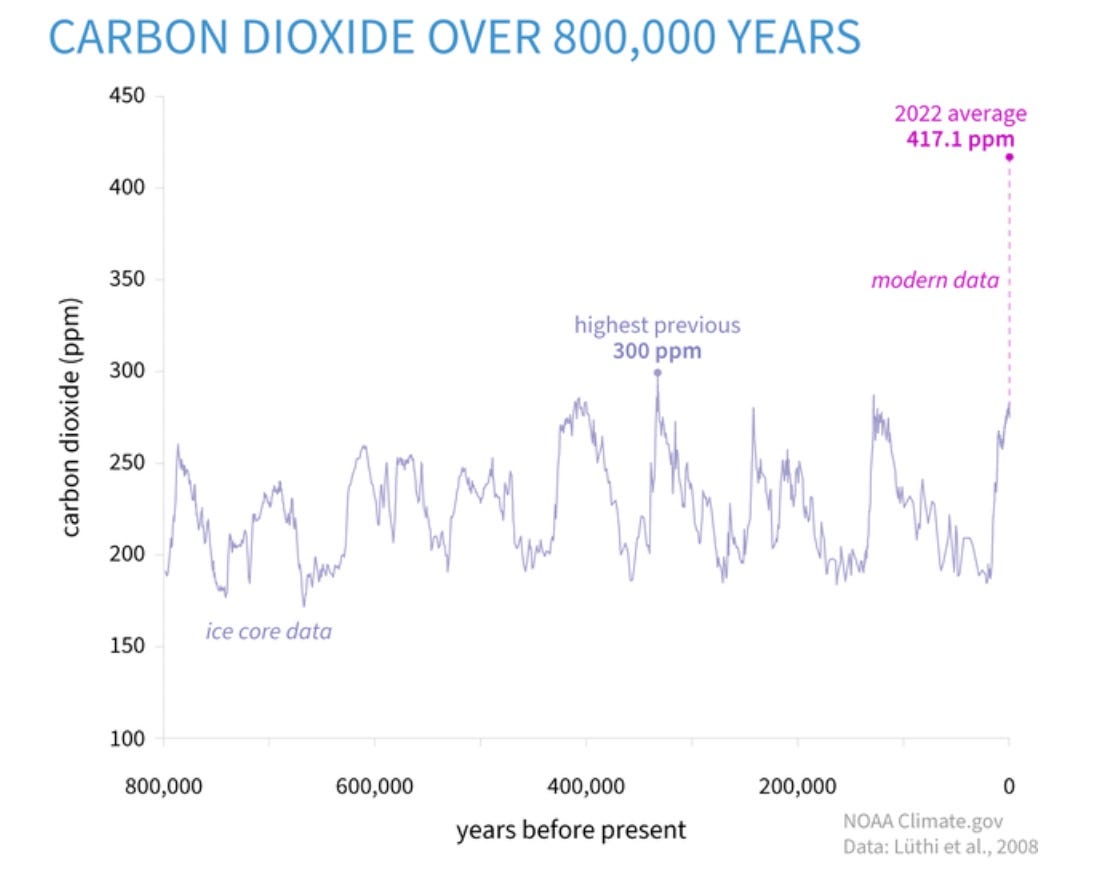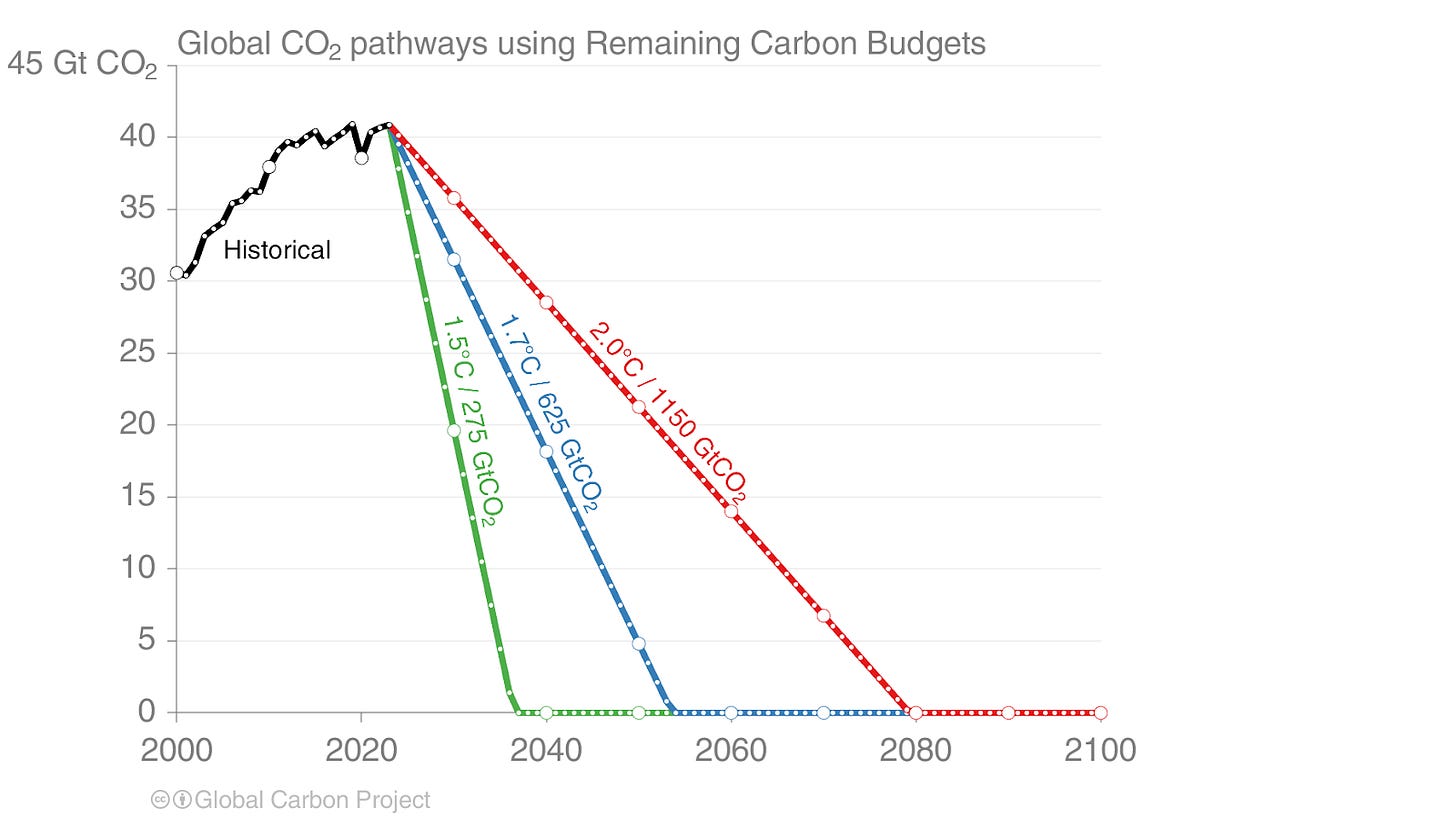Giving Up On 1.5C: A Personal and Climatic Journey
by Kamal Kapadia, Co-founder and Chief Learning Officer at Terra.do
Last month I killed 1.5 degrees Celsius. And it was wrenching.
Technically, our so-called leaders killed it. But in December 2023, for the first time, I requested our lead climate writer to go into the modules of Climate Change: Learning for Action, Terra.do’s flagship climate bootcamp course for professionals, and edit out the assertions that 'we can still keep average global heating under 1.5C above pre-industrial temperatures...' We replaced them with a stark reality—we will likely surpass 1.5C this decade.
Scientists tell us that limiting warming to under 1.5C above pre-industrial levels is critical for mitigating dangerous and irreversible changes to climactic systems and protecting human health, economies, and the natural world from potentially catastrophic impacts. Every fraction of a degree of warming matters—1.5C is not a “hard” threshold as such, but above 1.5C, the risks of extreme weather events, significant sea-level rise, and threats to sensitive ecosystems like coral reefs increase significantly.
Most worrying of all are the increased risks of crossing tipping points. Tipping points are “critical thresholds that, if exceeded, could push a system into an entirely new state.” A new report finds that five global systems are already at risk of crossing tipping points, even at the current level of warming. These include the Greenland and West Antarctic ice sheets, warm-water coral reefs, North Atlantic Subpolar Gyre circulation, and permafrost regions. Crossing 1.5C greatly increases these risks.
Let’s zoom in on just one of these tipping points to understand the risks. Scientists have used octopus DNA (yeah!) to find that the West Antarctic Ice Sheet (WAIS) probably collapsed around 120,000 years ago, when global temperatures were similar to today. The WAIS is Antarctica’s largest contributor to sea-level rise. If it collapsed completely, this one part of Antarctica alone could raise global sea levels by around 10 to 16 feet. The implications of this are staggering: We may have already precipitated an irreversible melt of the WAIS, before we’ve hit 1.5C.
For these reasons, the Paris Agreement, a global climate treaty signed by 195 countries in 2015, exhorts everyone "to pursue efforts to limit the temperature increase to 1.5C above pre-industrial levels...." Yet every Conference of Parties (COP) meeting, where signatories of the Agreement convene to hammer out its implementation details, starkly reminds us how far we are from achieving our goal.
While governments battle over small but significant words in COPs, the Earth has already warmed by about 1.1C to 1.3C since the pre-industrial period. We finished out 2023 around 1.5C above pre-industrial temperatures (Copernicus says 1.48C; Berkeley Earth reports 1.54C), though this does not yet mean we have crossed the proverbial 1.5C, which is an average temperature increase over a couple of decades. New research also finds that the rate of warming is accelerating. What’s surprising is that there is little consensus on when we can definitively say we have crossed 1.5C; we may not be able to tell till 10 years after the fact!
The primary cause of this warming, of course, is the burning of fossil fuels, chiefly coal, gas and oil, and the resulting emissions of greenhouse gases. Let’s put our current carbon dioxide levels in context, carbon dioxide being our chief greenhouse gas of concern. The last time in the past 800,000 years that the earth experienced present-day carbon dioxide levels was …never.
We have to go back three million years to find a period when atmospheric carbon dioxide concentrations were as high as they are today. At that time, “global surface temperature was 4.5–7.2 degrees Fahrenheit (2.5–4 degrees Celsius) warmer than during the pre-industrial era. Sea level was at least 16 feet higher than it was in 1900 and possibly as much as 82 feet higher.”
While this does not mean we will see these same temperatures or sea levels thanks to some fundamental differences in geography between these two periods, the experiment we have unleashed on ourselves is unprecedented in all of human history.
While in theory, we could still skirt 1.5C of global temperature increase, the evidence is stacked against it. Warming will only stop when we reach as close to zero emissions as possible. It’s not enough to just reduce our rates of emissions, we have to stop at least 90% of emissions. Until we do so, temperatures will keep increasing.
By delaying meaningful action for so long, the pathways to 1.5C have become increasingly unrealistic, given the current state of government action and corporate behavior. Consider this simple graphic that captures the carbon dioxide emissions reduction cliff we need to be on to achieve 1.5C. Note that the black line—our current trajectory—went up in 2023.
As per Climate Action Tracker, not one single country has policies that are compatible with a 1.5C warming limit. Even the U.S.’s Inflation Reduction Act, a historic piece of climate legislation, is not ambitious enough on its own to enable the country to be on a 1.5C-aligned path.
A realistic assessment of all global commitments and policies puts us on track for 2.2C to 3.4C of warming by 2100. Most scientists believe we will cross 1.5C in the early 2030s, though at least one prominent scientist, James Hansen, claims “The 1.5°C global warming level will have been reached [in 2023], for all practical purposes.” (Other scientists dispute his findings.)
Yet none of this is new. I had known for some years that reaching 1.5C was a stretch, yet I held fast to that optimistic goal in Terra.do’s course materials. If only governments and corporations rallied, if only they ratcheted up their efforts, we could get there, I believed.
But my faith began to dissolve by late November 2023. As I tracked the debates and outcomes of COP28 in Dubai, I could no longer drink my own Kool-Aid. With each passing day of COP28, I experienced an increasing sense of foreboding.
Instead of working to tighten our goals and strengthen policies to achieve them, representatives from big emitters bickered over how best to insert loopholes into commitments. While some progress was achieved on global climate finance, total pledged dollars continue to fall way short of the $2.4tn of investment a year that countries in the global South will need by 2030 to meet climate goals. And all this took place under the leadership of a COP President whose financial interest nakedly lies in the expansion of fossil fuel production. By the end of COP28, I knew that 1.5C as a goal was, practically speaking, dead.
In a year that provoked the typically non-alarmist climate scientist Zeke Hausfather to proclaim the temperature records of a single month to be “gobsmackingly bananas” and the year to be “pretty weird,” I directed my climate anxiety into class edits. I had no choice but to funnel these feelings into something manageable, like changing words in a slide, because otherwise, I would have to sit with the full weight of the dread I felt.
But in making the edits, my emotions transformed again. My dread evolved into a feeling of stubborn determination. So many people around the world are working so intensely hard to continue to push the levers on climate policy, tech, finance, education, justice and more. I am simply one of them and I refuse to give up. I refuse. If we reach 1.5 C of warming, I’ll work to keep us under 1.6 C, and if we get to 1.6 C, I’ll work for 1.7 C. Because hope is a choice. As is action. Onward!
🍿 The Lean Back
Learn about Beyond Aero’s hydrogen-powered aircraft in the latest MCJ Startup Series here.
🎙️ My Climate Journey Podcast
🔥 Scott Gale is Executive Director at Halliburton Labs. While Halliburton is known for its extensive fracking operations and infrastructure expertise in the oil and gas sector, Scott and his team are actively investing in and supporting the innovation ecosystem around clean energy and climate tech. Cody and Scott cover Halliburton Labs' startup collaborations, the interplay between its core business and these ventures, Scott's views on Halliburton's past controversies, hydrocarbons' economic role, and the energy transition's trajectory. They conclude with reflections on Houston's evolving innovation ecosystem. Listen to the episode here.
✈️ Eloa Guillotin is the Co-founder and CEO of Beyond Aero, which is exploring hydrogen as a fuel source for small business or private jets. This episode dives into the potential of hydrogen for this aircraft category, France's commitment to hydrogen aviation, how Beyond Aero has designed its solution and how Eloa sees the market evolving. Listen to the Startup Series here.
✨ MCJ Community Highlights

👩💻 Climate Jobs
For more open positions, check out the #j-climatejobs channel in MCJ Slack as well as our MCJ Job Board.
Director, Research at Air Company (New York, NY)
Associate, Client Relations at Arcadia (Remote)
Corporate Senior Paralegal at BlocPower (New York, NY)
Senior Project Analyst at Euclid (Remote)
Build Technician at Heirloom (Brisbane, CA)
Research Associate - Tissue Culture at Living Carbon (Charleston, SC)
Salesforce Technical Platform Manager at Runwise (New York, NY)
Supply Partnerships Lead-Carbon Removal at Salt (London, UK)
Business Development Manager at Sublime Systems (Remote)
Machine Learning Engineer - Geospatial AI at Zanskar (Salt Lake City, UT)
🗓 Climate Events
Click the event title for details & RSVP info. For more climate events, check out the #c-events channel in MCJ Slack.
🏛️ Climate DC Meetup: Whether you're a climate veteran or looking to transition, join us to chat about sustainability and climate tech. (Jan 24)
👋 MCJ Community Welcome Call: Connect, share and learn with the MCJ community. (Jan 25)
💁♀️ Women in Climate Meetup: This is a monthly meetup for women who work in, or want to work in climate. We use a Lean Coffee format, where we co-create the agenda in real-time and get through the topics that are most interesting to the group. (Jan 31)
♻️ How to Make Sustainability Part of Everybody’s Job: 2-hour interactive workshop with Drew Wilkinson that will give you the skills and resources needed to develop an effective workplace sustainability community. Participants will learn the fundamentals of employee community organizing through expert lectures followed by individual workbook assignments, and small group breakouts for networking and communal learning. (Feb 8)
The MCJ Collective Newsletter is a free weekly email curating news, jobs, My Climate Journey podcast episodes, and other noteworthy happenings in the MCJ member community.
💭 If you have feedback or items you’d like to include, feel free to reach out.
🤝 If you’d like to become an MCJ community member, apply today.
💡 Have a climate-related event or content topic that you'd like to see in the MCJ newsletter? Email us at content@mcjcollective.com





Kamal, thanks for sharing your thoughts and findings. You are such a good writer, and I thoroughly enjoyed the Terra.do Learning for Action course. I hope the climate impact of contrails is now incorporated in the course materials. Thanks!
Thanks for an honest and well written article! I agree, things do not look good at the moment. But there are things that can be done be done to limit the GHG-emissions that actually will work. See www.enenergy.net.